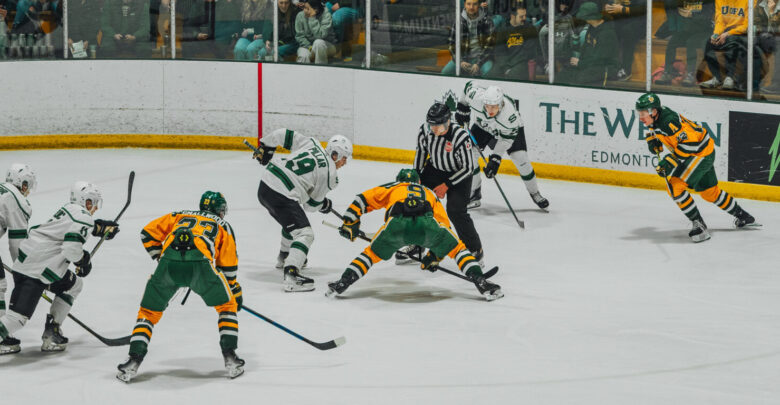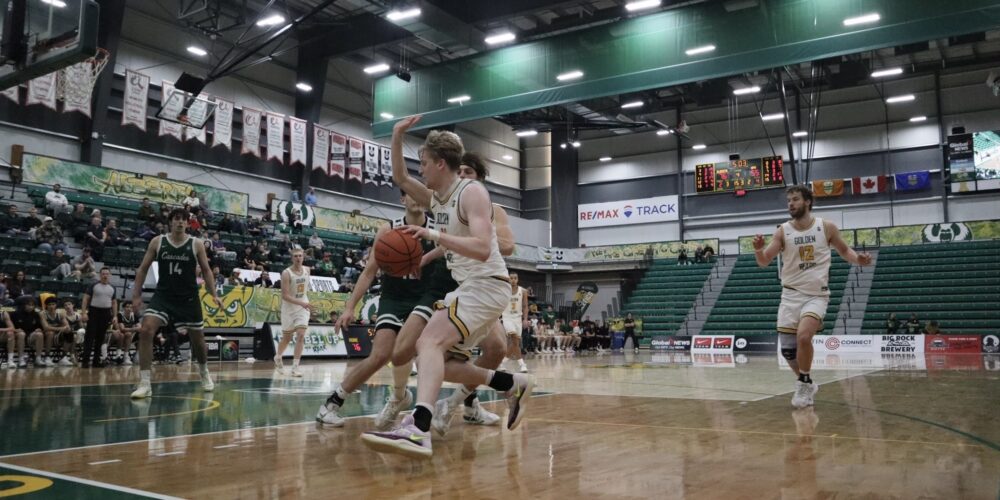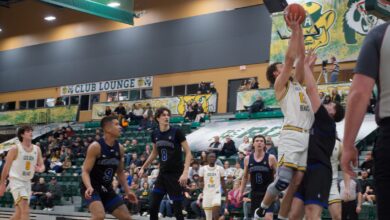Could Golden Bears hockey join NCAA?
For some, it's not a matter of if it'll happen, it's a matter of when. For others — perhaps those less involved in sports — it's a crazy idea.
 Fair Frames
Fair FramesThe University of Alberta Golden Bears aren’t just another hockey team in U Sports — they’re the hockey team.
They’ve been recruiting out of the Canadian Hockey League (CHL) for about as long as it’s been around, and are home to players such as five-time Stanley Cup winner, Randy Gregg.
Personal feelings and a semifinal loss aside, the Bears have been the poster team for U Sports hockey since its been around. Always have. Always will?
“The history of the Bears’ program, it’s pretty prestigious, I guess you could say, and I’ve known about the Bears for a long time. That was kind of the university that I’d been looking at going to for a while. So as soon as I got the offer, it was pretty much a done deal,” Bears’ starting goaltender Tyler Palmer explained, highlighting why he chose U of A in the first place.
Though times have changed, and recruitment presents itself as an all-time issue moving forward. As head coach Ian Herbers has mentioned, there’s five teams that can legitimately finish first. So — and stay with me here — what if the Bears weren’t the poster school for U Sports anymore, and instead they joined the National Collegiate Athletic Association (NCAA)?
The prospect is dizzying to say the least, and there’s no guarantee it could actually happen.
But if it did, here’s how it could work.
First things first, for this to even be worth it, the Bears would need to be a D1 team, maybe even D2 if the funding was right. Go D3, and they’d be playing worse teams than they typically see in U Sports.
Second, it would likely only be Golden Bears hockey, and it would run similarly to the Laval Rouge et Or’s football team, the only privately funded team in Canada.
The Rouge et Or’s are largely funded by Jacques Tanguay, a businessman based in Quebec who’s been a large part in why Laval is the powerhouse in football it’s always been. They were the first football team to have a fully paid coaching staff and the first team to use video editing.
Let’s face it, money makes programs better. Money makes teams win 12 Vanier Cups and 17 conference championships, including an 11-year title streak.
There’s the obvious stipulation that whoever is funding the team has a say over the team. But in Canada, with no rules saying intercollegiate sports cannot be fully funded and overseen by private enterprise, it’s a bit of a non-issue. Same goes for the NCAA, who uses name, image, and likeness deals (NILs), to privately fund their players and teams.
Another method is through “brand partnerships,” similar to Under Armour and Notre Dames recent 10-year, 10 million annual average contract extension towards the program through cash and gear.
Of course, there actually has to be interest in funding said team, and as of now, there’s no way to definitively say that the Bears have it. But as we’ve said, if there was ever a team to find the money and go through the lengthy application, it’s this one.
As of now, Simon Fraser is the only Canadian university to join NCAA — a seven-year long process — but in 2009, the U of A had publicly presented interest in jumping leagues while never actually following through.
Pros and cons to joining NCAA
Pros: The Bears would have more funding. Enough said really.
But even more, they might be able to fix their current recruitment issue of losing top prospects to the NCAA, because well, they’d be the NCAA. At the very least, they’d be more desirable then they already are.
It’s not coincidental that right as CHL players are eligible to join NCAA, this becomes a topic of discussion.
Cons: The cross-boarder travel and inability to host championship games might be the most taxing on the players. The most taxing for the team, might be the “prestige” of the program.
As of now, the Bears are considered to be one of the best teams in U Sports and seldom travel further than Manitoba. Join NCAA and they’d be the newest team, coming out of what some would deem a worse league, and unable to host any championships — number one seeded or not — due to documentation issues for such a large number of athletes.
That’s even if the U of A would give up some control over one of their better-known teams — private funding and all that. It’s hard to say they would. It’s hard to say it wouldn’t help them either.




